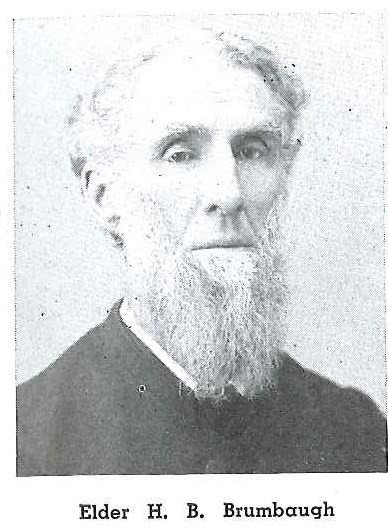Henry Boyer Brumbaugh (April 01, 1836 – June 28, 1919)
He, his brother John Brumbaugh and their cousin Andrew B. Brumbaugh, along with Professor Jacob M. Zuck, started what today is known as Juniata College in 1876
Henry B. Brumbaugh was born on April 01, 1836 to Catharine and John Boyer Brumbaugh, the latest in a long line residing in central Pennsylvania; he was the fourth of six sons. He grew up near Huntingdon, Pennsylvania on a farm on the Raystown branch of the Juniata River. Henry attended public schools and the Williamsburg Academy. He then taught in the Huntingdon County public schools for nine years, before becoming a full time farmer. In 1860, Henry married Susan Peightal. They had one son, Isaac Harvey Brumbaugh, who would go on to become a teacher and, later, a president of Juniata College.
Henry Brumbaugh was also a dedicated member of the Brethren church; he was an elder in the free ministry in Huntingdon, where he also served as a preacher. The free ministries were local non- professional churches, in which the ministers and leaders were chosen from the congregation. They served without salary and were often members with roots as community leaders. This system dated back to the old Baptist Brethren system common in rural areas. Henry’s education and status as a descendant of the first Brethren settlers in central Pennsylvania would have made him an ideal candidate for such a position.
In 1870, Henry partnered with his younger brother John to start a publishing company producing a weekly periodical called The Pilgrim. This was the third Brethren periodical to be created in the United States and was a direct response to Henry R. Holsinger’s recently created The Christian Family Companion, which aggravated the controversy of doctrine and practice that was already raging in the community. The Brumbaughs published The Pilgrim to counterbalance the progressive tone in its rival publication. Their first issue appeared January 1, 1870. According to the introduction, as stated in the first issue, The Pilgrim’s goals included “reflecting upon the temptations and dangers to which our youth are exposed, in this fast age of the world, when thousands are ensnared by the sinful hallucinations of the enemy,” and the “Christianization of humanity” through exposing sinners to “burning thoughts and heavenly truths.” In short, they wanted to write a magazine to support Christian values and help in the raising of Christian families. The second goal was the ever-present desire to spread Christianity and bring non-believers into the fold.
After a series of mergers, The Pilgrim became The Gospel Messenger in 1883; Henry remained involved and became the eastern editor, a position he retained until 1909. He was the first editor to appoint women to editorial positions, which he did in his juvenile magazines. In addition to publishing the magazine, Henry also printed The Brethren’s Church Manual, which was a guide to conducting services and reading sermons. It was the first of its type within the Brethren denomination. Not content to limit his writing to church news and practice, he also tried his hand at writing romance novels; though, Onesimus, the Runaway Slave. Brumbaugh published the book in 1910 under the Brethren Publishing House; it was the story of forbidden love between Athalia and the slave Onesimus, all written with a sharp religious slant.
Henry Brumbaugh was one of the founders of Juniata College, a school conceived to fill the role of the long sought-after church school for the Brethren. Henry, his brother John, and Jacob Zuck, opened the school April 17, 1876 in the upstairs of The Pilgrim building. The building served as the printing house of the Brumbaughs’ publishing company; an acquisition that Henry made when he moved his business and family to Huntingdon in anticipation of starting Juniata, or at the time, The Huntingdon Normal School. Classes remained in The Pilgrim building until 1879, when the school became incorporated. Despite being a Brethren school, the founders made it clear from the start that it was “denominational, but not sectarian.” The goal was to prepare students “for teaching, for life, and for college.” Brumbaugh advertised the school through The Pilgrim, stressing its location in Huntingdon. Huntingdon was described to perspective students and their families emphasizing that the “health and morals of the place are as good as can be found anywhere and much better than in most towns of the same size.” The success of these first academic years gained the support needed to move the school to its own land and expand.
Brumbaugh continued to have an intimate role in the expanding school. In addition to consistently teaching in the Bible Department, which he also chaired, Henry Brumbaugh served as chairman of the board of trustees for forty years, from the Board’s formation in 1879 until his death in 1919, just after his eighty-third birthday. He also took over as president of the college in 1878, after the death of previous president, Elder James Quinter, a post he held until 1894, when he resigned and turned over the presidency to Martin G. Brumbaugh.
Russell Jacobsen ‘14
Bibliography
The Brethren Encyclopedia. Philadelphia: Brethren Encyclopedia, 1983.
Brumbaugh, Gaius Marcus. Genealogy of the Brumbach families : including those using the following variations of the original name, Brumbaugh, Brumbach, Brumback, Brombaugh, Brownback, and many other connected families. New York : F. H. Hitchcock, 1913. http://archive.org/details/genealogyofbrumb00brum.
Brumbaugh, H. B. (Henry Boyer), and J. B. Brumbaugh. The Pilgrim (1870-1871). Accessed March 25, 2013. http://archive.org/details/pilgrim187018711144brum.
Brumbaugh, H. B., and Brethren Publishing House. Onesimus: The Runaway Slave. Elgin: Brethren Publishing House, 1909. http://catalog.hathitrust.org/Record/008961287.
David Emmert. Reminiscences of Juniata College, Quarter Century, 1876-1901. David Emmert, 1901. http://archive.org/details/reminiscencesju00emmegoog.
Kaylor, Earl C. Juniata College: Uncommon Vision, Uncommon Loyalty: The History of an Independent College in Pennsylvania Founded by the Brethren 1876-2001. Huntingdon: Juniata College Press, 2001.

